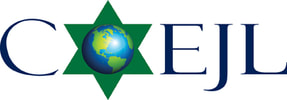Endangered Species.
Jewish tradition teaches us that, as humans, we are part of the created world--inextricably joined to the myriad other creatures which God created and God called good. The tradition also teaches that we are unique among the creatures, created in the Divine image. The Jewish people have for millennia understood ourselves to be responsible for healing the fractures of our imperfect world, as we as Jews are called to serve as “partners in Creation.”
What does it mean in this generation for us to be partners in Creation? What fractures in the integrity of the world are we compelled to heal?
In this generation, the ecological integrity of God’s world is at risk. Wetlands, forests, rivers, lakes, coral reefs and many other whole ecosystems are threatened by pollution, human encroachment, and resource extraction. Many species that depend upon these systems are in danger of being extinguished forever from the face of the earth. Unless we change our course, humankind will destroy millions of species in the next half-century.
In early October 1996, the World Conservation Union released the most comprehensive survey to date of endangered species around the world. The survey indicates that one quarter of mammals are in danger of extinction, and that one half of those may be extinct within a decade: The finding that 25 percent of mammal species are threatened with extinction must drastically increase the urgency of conservation initiatives around the globe….
The most significant threat to the majority of species at risk of extinction was found to be habitat reduction, fragmentation, and degradation, reflecting human population growth combined with economic development. A surprisingly important factor was introduction of non-native species, along with exploitation, pollution, and climate change.
The World Conservation Union survey found that in addition to 25 percent of mammals, 20 percent of reptiles, 25 percent of amphibians and 34 percent of fish are in danger of extinction.
The preservation of species is a moral obligation. It is also practical to human well-being. Like the canary in the coal mine, human caused extinction of species is an early warning sign of ecosystem disintegration and a threat to human existence. Ecosystems provide for our sustenance and well-being by purifying our water, creating oxygen, generating soil, and providing the primary genetic and biochemical resources upon which agriculture, medicine and industry rely. Protecting species and their habitats is both a righteous and practical thing to do.
The Torah tells us that when God inundated the earth with a flood, Noah and his family protected at least two of every animal species, enabling all of God’s creatures to make safe passage from one era to the next. In this generation, we too must ensure safe passage of God’s creatures from one ear to the next by protecting their habitats.
"Behold, I establish My covenant with you, and with your seed after you, and with every living creature that is with you, of the birds, of the cattle, and of every wild animal of the earth with you… " -Genesis 9:9.
The message of the Jewish community on issues of protecting endangered species should be clear. Endangered species are God’s creatures. We have an obligation to protect them.
Source: Project Noah
What does it mean in this generation for us to be partners in Creation? What fractures in the integrity of the world are we compelled to heal?
In this generation, the ecological integrity of God’s world is at risk. Wetlands, forests, rivers, lakes, coral reefs and many other whole ecosystems are threatened by pollution, human encroachment, and resource extraction. Many species that depend upon these systems are in danger of being extinguished forever from the face of the earth. Unless we change our course, humankind will destroy millions of species in the next half-century.
In early October 1996, the World Conservation Union released the most comprehensive survey to date of endangered species around the world. The survey indicates that one quarter of mammals are in danger of extinction, and that one half of those may be extinct within a decade: The finding that 25 percent of mammal species are threatened with extinction must drastically increase the urgency of conservation initiatives around the globe….
The most significant threat to the majority of species at risk of extinction was found to be habitat reduction, fragmentation, and degradation, reflecting human population growth combined with economic development. A surprisingly important factor was introduction of non-native species, along with exploitation, pollution, and climate change.
The World Conservation Union survey found that in addition to 25 percent of mammals, 20 percent of reptiles, 25 percent of amphibians and 34 percent of fish are in danger of extinction.
The preservation of species is a moral obligation. It is also practical to human well-being. Like the canary in the coal mine, human caused extinction of species is an early warning sign of ecosystem disintegration and a threat to human existence. Ecosystems provide for our sustenance and well-being by purifying our water, creating oxygen, generating soil, and providing the primary genetic and biochemical resources upon which agriculture, medicine and industry rely. Protecting species and their habitats is both a righteous and practical thing to do.
The Torah tells us that when God inundated the earth with a flood, Noah and his family protected at least two of every animal species, enabling all of God’s creatures to make safe passage from one era to the next. In this generation, we too must ensure safe passage of God’s creatures from one ear to the next by protecting their habitats.
"Behold, I establish My covenant with you, and with your seed after you, and with every living creature that is with you, of the birds, of the cattle, and of every wild animal of the earth with you… " -Genesis 9:9.
The message of the Jewish community on issues of protecting endangered species should be clear. Endangered species are God’s creatures. We have an obligation to protect them.
Source: Project Noah
